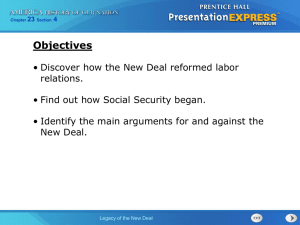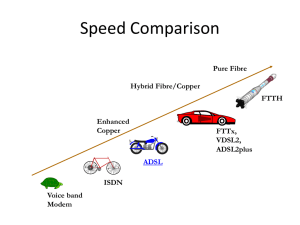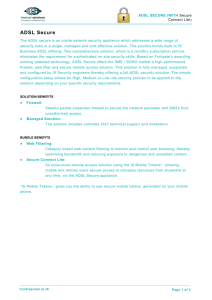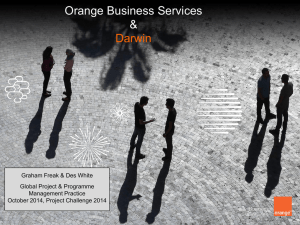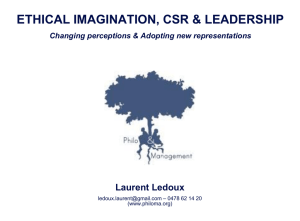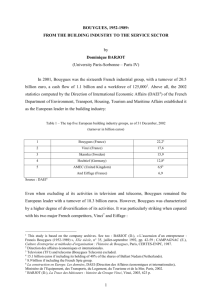Broadband on the cheap - MIT - Communications Futures Program
advertisement
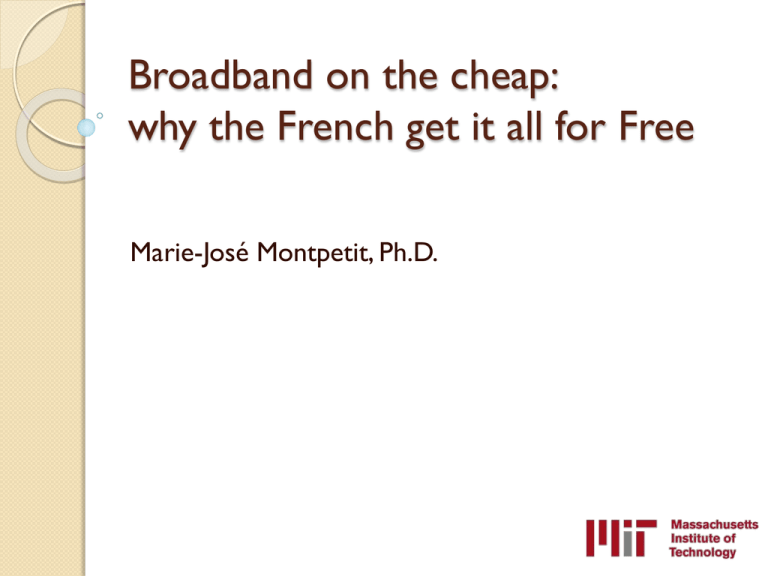
Broadband on the cheap: why the French get it all for Free Marie-José Montpetit, Ph.D. Acknowledgements Professor Gilles Laurent, Télécom-Paris University Professor Jean-Pierre Chamoux, ParisDescartes University François Bélorgey, Patrice Slupowsky and Morgan Bouchet, FT/Orange David Clark, Chintan Vaishnav and Bill Lehr, MIT Legacy In the 70’s France had the lowest phone penetration ◦ Led to a major government led infrastructure initiative 80’s-90’s: Minitel ◦ ◦ ◦ ◦ Started in 1982 Inexpensive Always “on” Not just directory but useful services Schedules, tickets, reservations, weather, news ◦ Delayed the Internet penetration 90’s opening the local access 00s services competition The Original Players France Telecom ◦ The legacy monopoly operator started with PTT (Poste, Télégraphe et Téléphone)in 1923 Separated from the Post in 1991 ◦ Still 14% state owned Full tate ownership ended in 2004 The PDG (CEO) is named by the government ◦ Pension/bureaucratic legacy (and change is hard) ◦ Now Orange Wired/wireless merger Société Française de Radiotéléphone (SFR) ◦ Started as radio-telephony in 1987 ◦ Bought Neuf-Cegetel to create an alternative to FT ◦ 100% owned by Vivendi Bouygues Telecom ◦ Part of a huge industrial/construction conglomerate that dates back 150 years WILL UNBUNDLING CREATES SERVICE COMPETITION? European Union Mandates The EU mandated opening the local loop by 1998: ◦ Opening the EU market to competition and lower costs for the “Information Society” ◦ Defining rules and tariffs to support competitor’s equipment in control centers ◦ Supply aspects: equipment not manufactured in Europe, fear of capital movements out of the EU Each EU member can interpret these mandates differently ◦ In France, regulations started in 1991, took effect in 1997 Opening the Local Loop in France Tariffs: Imposed by the regulator ◦ Professor Gilles Laurent of Télécom-Paris helped define the 2000 prices that were used to open the market (Forward-looking long-run incremental cost, LRIC) Competition: mainly ADSL ◦ While the cable infrastructure was also built by the government, it was not greatly adopted (Numéricable’s offering is limited) Differentiation: ancillary services Criticism: from the legacy operator “who lose the control of the network loses the control of the service innovation” (François Bélorgey - Orange) Collusion: the operators fight back ◦ In 2005 the 3 main French operators were found guilty by the Conseil de la Concurrence for sharing confidential information between 1997 and 2003 (535 million € fine) AND THEN IT BECAME An Entrepreneur in Telecoms Il a Free, il a tout compris !http://www.ina.fr/histoireet-conflits/decolonisation/video/I00012428/charles-de-gaulle-petite-phraseje-vous-ai-compris.fr.html Feel Free La liberté n'a pas de prix ◦ (Freedom has no price) Incroyable mais Free ◦ Pun on “incroyable mais vrai” – unbelievable but true But this is NOT a Pirate Story Free is owned by Illiad, a communications group ◦ Not predatory, they seek profit ◦ They profit from the low unbundling costs of 8,5€ per month per line for ADSL (effective 2012) Free started in 1999 as a “free” email service with no subscription ◦ “Free” now refers to the absence of contracts ADSL offering in 2002 ◦ TV and illimited voice added in 2003 Innovative approaches ◦ The initiator of the “box” Freebox: single box for all services (Freebox Revolution – 2nd generation) ◦ Low opex ◦ Takes user behavior into account Some Free Statistics Flat 29,99€ per month with Freebox Revolution ◦ ◦ ◦ ◦ ◦ ◦ ◦ (FTTH adds 10€) Add 1,99€ for 197 TV channels and 4,99€ for multiscreen 28 Mbps on unbundled phone line/33 Mbps on their own lines 250 GB DVR included 802.11n IPV6 Zero cost VoIP calls to 180 countries and to French mobiles Add mobile for 15,95€ ◦ (19,95€ if you are not a Freebox customer) ◦ Unlimited texting ◦ Free mobile to mobile calls to France, Canada and US and to fixed numbers in 40 countries ◦ 3GB data “Freewifi” ◦ Each Freebox is a hot spot Ancillary services ◦ ◦ ◦ Premium channels packages available for 6,99€+ (mainly cinema and foreign language channels) TV-Perso (your own TV channel), Bluray disk , Gaming (some free), browsing etc. Application store Too Free to be True? Freebox: hefty security deposit ◦ 400€ Prevents a grey market for the boxes Reimbursed after 2 years No contract but 49€ termination fee (24 months) No family plans on mobile No phone subsidies ◦ They allow you to pay your iPhone is 2 installments! Questionable level of support ◦ 10 hours on “working days” ◦ But “improving” according to blogs Accused of monopoly on some condo agreements Their new mobile license has not been very successful THE “BALANCE OF TERROR” (PROF. LAURENT) A Quadrupoly Capitalism at work: Free created a competitive market ◦ All operators are profitable ◦ Orange, SFR and Bouygues now offer similar boxes and packages with added services, more TV channels, games, premium customer service etc. The low costs have expanded the broadband market ◦ 6 percentage points from 2005-2008 Ref. Princeton/ARCEP Study – 2008 Getting more Revenue Operators are also looking at foreign operations: ◦ Export the French know-how ◦ FT/Orange in Poland in Asia They have a larger proportion of retirees, legacy government employees et other historical costs so an incentive to look abroad for less regulated environments ◦ SFR in La Réunion ◦ Free in some US markets Next Generation Because the DSL is so good FFTH is slow to get market share in France ◦ Consumers: why go above 30Mbps? ◦ In FTTH, each company installs or buys it’s own infrastructure Probably not the end of the quadrupoly Conclusion The French broadband market shows that competition works Profited from a government paid infrastructure that moved the competition to the services Will be interesting to see what will happen in the future ◦ The next innovation? COULD THIS HAPPEN IN THE US? An interesting discussion topic

